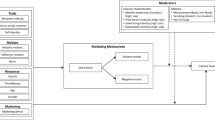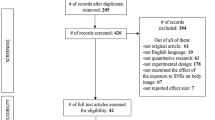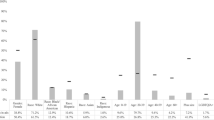Abstract
Money and possessions hold strong attractions, but being driven to acquire them in order to enhance one's social standing is associated with lowered well-being. Literatures on money and happiness, materialism, and cultural mediators are reviewed. Consumer well-being is associated with being neither very tight nor very loose with money, with having relatively low financial aspirations, and with being low in materialism. Price-related behaviors – whether to spend low, spend high, or attempt to maximize value – are ways of responding to economic outlay vis-à-vis material wants, and these "strategies" offer a window into broader consumer lifestyles: the Value Seeker type is tight with money and materialistic; the Big Spender is loose with money and materialistic; the Non-Spender is tight with money and not materialistic; and the Experiencer is loose with money and not materialistic. Each of these types is described in terms of the potentials for well-being as well as the risks. Intrinsic motivation emerges as a key to well-being.
Similar content being viewed by others
REFERENCES
Aaker, J.L. and A.Y. Lee: 2001, ‘“I” seek pleasures and “we” avoid pains: The role of self-regulatory goals in information processing and persuasion’, Journal of Consumer Research 28(1), pp. 33-49.
Achenreiner, G.B.: 1997, ‘Materialistic values and susceptibility to influence in children’, in M. Brooks & D.J. MacInnis (eds.), Advances in Consumer Research, Vol 24 (Association for Consumer Research, Provo, UT), pp. 82-88.
Ahuvia, A.C.: 2002, ‘Individualism/collectivism and cultures of happiness: A theoretical conjecture on the relationship between consumption, culture and subjective wellbeing at the national level’, Journal of Happiness Studies 3(1), pp. 23-36.
Ahuvia, A.C. and D.A. Friedman: 1998, ‘Income, consumption, and subjective wellbeing’, Journal of Macromarketing 18(2), pp. 153-168.
Ahuvia, A.C. and N.Y. Wong: 2002, ‘Personality and values based materialism: Their relationship and origins’, Journal of Consumer Psychology 12(4), pp. 289-402.
Ailawadi, K.L., S.A. Neslin and K. Gedenk: 2001, ‘Pursuing the value-conscious consumer: Store brand versus national brand promotions’, Journal of Marketing 56(1), pp. 71-89.
Bei, L.-T. and R. Heslin: 1997, ‘The Consumer Reports mindset: Who seeks value the involved or the knowledgeable?’, in M. Brooks & D.J. MacInnis (eds.), Advances in Consumer Research, Vol 24 (Association for Consumer Research, Provo, UT), pp. 151-158.
Belk, R.W.: 1985, ‘Trait aspects of living in the material world’, Journal of Consumer Research 12(December), pp. 265-280.
Belk, R.W.: 1995, ‘Collecting as luxury consumption: Effects on individuals and households’, Journal of Economic Psychology 16, pp. 477-490.
Belk, R.W. and G.S. Coon: 1993, ‘Gift giving as agapic love: An alternative to the exchange paradigm based on dating experiences’, Journal of Consumer Research 20(December), pp. 393-417.
Belk, R.W., M. Wallendorf, J. Sherry, M. Holbrook and S. Roberts: 1988, ‘Collectors and collecting’, in M. Houston (ed.), Advances in Consumer Research, Vol 15 (Association for Consumer Research, Provo, UT), pp. 548-553.
Bloch, P.H., D.L. Sherrell and N.M. Ridgway: 1986, ‘Consumer search: An extended framework’, Journal of Consumer Research 13(June), pp. 119-126.
Browne, B.A. and D.A. Kaldenberg: 1997, ‘Conceptualizing self-monitoring: Links to materialism and product involvement’, Journal of Consumer Marketing 14(1), pp. 31-44.
Brooks, D.: (1999, April-May), ‘Cell phone naturalists’, Utne Reader, pp. 74-80.
Carver, C.S. and E. Baird: 1998, ‘The American dream revisited: Is it what you want or why you want it that matters?’, Psychological Science 9(July), pp. 289-292.
Chatterjee, A. and J.M. Hunt: 1996, ‘Self-monitoring as a personality correlate of materialism: An investigation of related cognitive orientation’, Psychological Reports 79, pp. 523-528.
Chiagouris L. and L.E. Mitchell: 1997, ‘The new materialists’, in L.R. Kahle & L. Chiagouris (eds.), Values, Lifestyles, and Psychographics (Erlbaum, Mahwah, NJ), pp. 263-282.
Cummins, R.A.: 2000, ‘Personal income and subjective well-being: A review’, Journal of Happiness Studies 1, pp. 133-158.
Czikszentmihali, M.: 1999, ‘If we are so rich, why aren’t we happy?’, American Psychologist 54(10), pp. 821-827.
Diener, E.: 1984, ‘Subjective well-being’, Psychological Bulletin 95, pp. 542-575.
Diener, E.: 2000, ‘Subjective well-being: The science of happiness and a proposal for a national index’, American Psychologist 55(1), pp. 34-43.
Diener,E. and R. Biswas-Diener: 2002,‘Will money increase subjective well-being?’, Social Indicators Research 57, pp. 119-169.
Diener, E., M. Diener and C. Diener: 1995, ‘Factors predicting the subjective well-being of nations’, Journal of Personality and Social Psychology 69(5), pp. 851-864.
Dominguez, J. and V. Robin: 1992, Your Money or Your Life: Transforming your Relationship with Money and Achieving Financial Independence (Penguin, New York).
Doyle O.: 1992, ‘Toward a psychology of money’, American Behavioral Scientist 35(6), pp. 708-724.
Ewen, S.: 1988, All Consuming Images: The Politics of Style in Contemporary Culture (Basic Books, New York).
Faber, R.J. and T.C. O'Guinn: 1992, ‘A clinical screener for compulsive buying’, Journal of Consumer Research 19(December), pp. 459-469.
Frum, D.: (1998, July 17), ‘How millionaires get that way’, The New York Times. A19.
Furnham, A.: 1984, ‘Many sides of the coin: The psychology of money usage’, Personality and Individual Differences 5(5), pp. 501-509.
Furnham, A. and R. Okamura: 1999, ‘Your money or your life: Behavioral and emotional predictors of money pathology’, Human Relations 52(9), pp. 1157-1177.
Ger, G. and R.W. Belk: 1990, ‘Measuring and comparing materialism crossculturally’, in M. Goldberg, G. Corn & R. Pollay (eds.), Advances in Consumer Research, Vol 17 (Association for Consumer Research, Provo, UT), pp. 186-192.
Goldberg, C.: (1995, September 21), ‘Choosing the joys of a simplified life’, The New York Times section C, pp. 1, 9.
Grewal, D., R. Krishnan, J. Baker and N. Borin: 1998, ‘The effect of store name, brand name and price discounts on consumers’ evaluations and purchase intentions’, Journal of Retailing 74(3), pp. 331-372.
Hagerty, M.R.: 2000, ‘Social comparisons of income in one’s community: Evidence from national surveys of income and happiness’, Journal of Personality and Social Psychology 78(4), pp. 764-771.
Hanley, A. and M.S. Wilhelm: 1992, ‘Compulsive buying: An exploration into selfesteem and money attitudes’, Journal of Economic Psychology 13, pp. 5-18.
Heslin, R., B.T. Johnson and B.F. Blake: 1989, ‘Saver-spender scales’, in D.W. Schumann (ed.), Proceedings of the Society for Consumer Psychology, 1988 Annual Convention of the American Psychological Association (American Psychological Association, Washington, D.C.), pp. 179-185.
Hirschman, E.: 1990, ‘Secular immortality and the American ideology of affluence’, Journal of Consumer Research 17(June), pp. 31-42.
Holt, D.B.: 1995, ‘How consumers consume: A typology of consumption practices’, Journal of Consumer Research 22(June), pp. 1-16.
Holt, D.B.: 1998, ‘Does cultural capital structure American consumption?’, Journal of Consumer Research 25(June), pp. 1-25.
Kasser, T.: 2002, ‘The High Price of Materialism’ (MIT Press, Cambridge).
Kasser, T. and A. Ahuvia: 2002, ‘Materialistic values and well-being in business students: A brief empirical reply to Sagiv & Schwartz (2000)’, European Journal of Social Psychology 32(1), pp. 137-146.
Kasser, T., T. Koestner and N. Lekes: 2002, ‘Early family experiences and adult values: A 26-year prospective longitudinal study’, Personality and Social Psychology Bulletin 28(6), pp. 826-835.
Kasser, T. and R.M. Ryan: 1993, ‘A dark side of the American dream: Correlates of financial success as a central life aspiration’, Journal of Personality and Social Psychology 65(2), pp. 410-422.
Kasser,T. and R.M. Ryan: 1996, ‘Further examining the American dream: Differential correlates of intrinsic and extrinsic goals’, Personality and Social Psychology Bulletin 22, pp. 80-87.
Kasulis, J.: (1991, September), ‘The frugal family of the nineties’, Retailing Issues Letter 3.
Kuczynski, A.: (2002, September 22), ‘Lifestyles of the rich and red-faced’, The New York Times Section 9, pp. 1, 8.
Lasch, C.: 1991, The Culture of Narcissism: American Life in an Age of Diminishing Expectations’ (W.W. Norton, New York).
Leach, W.: 1993, Land of Desire: Merchants, Power, and the Rise of a New American Culture (Pantheon, New York).
Lichtenstein, D.R., P.H. Bloch and W.C. Black: 1988, ‘Correlates of price acceptability’, Journal of Consumer Research 15(September), pp. 243-252.
Lichtenstein, D.R., N.M. Ridgway and R.G. Netemeyer: (1993). ‘Price perceptions and consumer shopping behavior: A field study’, Journal of Marketing Research 30(May), pp. 234-245.
Lim, V.K.G. and S.H. Teo: 1997, ‘Sex, money and financial hardship: An empirical study of attitudes towards money among undergraduates in Singapore’, Journal of Economic Psychology 18, pp. 369-386.
Lunt, P.K. and S.M. Livingstone: 1991, ‘Psychological, social and economic determinants of saving: Comparing recurrent and total savings’, Journal of Economic Psychology 12, pp. 621-641.
MacCannell, D.: 2002, ‘The ego factor in tourism’, Journal of Consumer Research 29(1), pp. 146-151.
Mamorstein, H., D. Grewal and R.H. Fishe: 1992, ‘The value of time spent in pricecomparison shopping: Survey and experimental evidence’, Journal of Consumer Research 19(June), pp. 52-61.
Mano, H. and M.T. Elliott: 1997, ‘Smart shopping: The origins and consequences of price savings’, in M. Brooks & D.J. MacInnis (eds.), Advances in Consumer Research, Vol 24 (Association for Consumer Research, Provo, UT), pp. 504-510.
Maslow, A.: 1970, Motivation and Personality (Harper & Row, New York).
McGowan, K.M. and B.J. Sternquist: 1998, ‘Dimensions of price as a marketing universal:Acomparison of Japanese and U.S. consumers’, Journal of International Marketing 6(4), pp. 49-65.
McClure, R.F.: 1984, ‘The relationship between money attitudes and overall pathology’, Psychology: A Quarterly Journal of Human Behavior 21, pp. 4-6.
Medina, J.F., J. Saegert and A. Gresham: 1996, ‘Comparison of Mexican-American and Anglo-American attitudes toward money’, Journal of Consumer Affairs 30(Summer), pp. 124-146.
Michalos, A.C.: 1985, ‘Multiple discrepancies theory (MDT)’, Social Indicators Research 16, pp. 347-413.
Micken, K.S.: 1995, ‘Anewappraisal of the Belk materialism scale’, in F.R. Kardes & M. Sujan (eds.), Advances in Consumer Research, Vol 22 (Association for Consumer Research, Provo, UT), pp. 398-405.
Myers, D.G.: 2000, ‘The funds, friends and faith of happy people’, American Psychologist 55(1), pp. 56-67.
Oishi, S., E.F. Diener, R.E. Lucas and E.M. Such: 1999, ‘Cross-cultural variations in predictors of life satisfaction: Perspectives from needs and values’, Personality and Social Psychology Bulletin 25(8), pp. 980-990.
Oropesa, R.S.: 1995, ‘Consumer possessions, consumer passions, and subjective well-being’, Sociological Forum 10(June), pp. 215-244.
Oyserman, D., H.M. Coon and M. Kemmelmeier: 2002a, ‘Rethinking individualism and collectivism: Evaluation of theoretical assumptions and meta-analyses’, Psychological Bulletin 128(1), pp. 3-72.
Oyserman, D., M.Kemmelmeier and H.M. Coon: 2002b, ‘Cultural psychology, a new look: Reply to Bond (2002), Fiske (2002), Kitayama (2002) and Miller, (2002)’, Psychological Bulletin 128(1), pp. 110-117.
Putnam, R.O.: 2000,Bowling alone: The collapse and revival of American community (Simon & Schuster, New York).
Rao, A. and K.B. Monroe: 1988, ‘The moderating effect of prior knowledge on cue utilization in product evaluations’, Journal of Consumer Research 15(September), pp. 253-264.
Rao, A. and W.A. Sieben: 1992, ‘The effect of prior knowledge on price acceptability and the type of information examined’, Journal of Consumer Research 19(September), pp. 256-270.
Ratner, R.K. and B.E. Kahn: 2002, ‘The impact of private versus public consumption on variety-seeking behavior’, Journal of Consumer Research 29(2), pp. 246-257.
Rice, R.W., S.M. Phillips and D.B. McFarlin: 1090, ‘Multiple discrepancies and pay satisfaction’, Journal of Applied Psychology 75(4), pp. 386-393.
Richins, M.L.: 1994, ‘Special possessions and the expression of material values’, Journal of Consumer Research 21(December), pp. 522-533.
Richins, M.L. and S. Dawson: 1992, ‘A consumer values orientation for materialism and its measurement: Scale development and validation’, Journal of Consumer Research 19(December), pp. 303-316.
Richins, M.L. and F.W. Rudmin: 1994, ‘Materialism and economic psychology’, Journal of Economic Psychology 15, pp. 217-231.
Rindfleisch, A., D. Freeman and J.F. Burroughs: 2000, ‘Nostalgia, materialism, and product preference: An initial inquiry’, Advances in Consumer Research 27, pp. 36-41.
Rogers, C.R.: 1961, On Becoming a Person (2nd edn) (Houghton Mifflin, NewYork).
Rubenstein, C.: (1981, May), ‘Money and self-esteem, relationships: secrecy, envy, satisfaction’, Psychology Today pp. 29-44.
Ryan, R., V.I. Chirkov, T.D. Little, K.M. Sheldon, E. Timoshina and E.L. Deci: 1999, ‘The American dream in Russia: Extrinsic aspirations and well-being in two cultures’, Personality and Social Psychology Bulletin 25(12), pp. 1509-1524.
Schor, J.B.: 1992, The Overworked American: The Unexpected Decline of Leisure (Basic Books, New York).
Schor, J.B.: 1998, The Overspent American: Upscaling, Downshifting, and the New Consumer (Basic Books, New York).
Schroeder, J.E. and S.S. Dugal: 1995, ‘Psychological correlates of the materialism construct’, Journal of Social Behavior and Personality 10(1), pp. 243-253.
Schyns, P.: 1998, ‘Crossnational differences in happiness: Economic and cultural factors explored’, Social Indicators Research 43, pp. 3-26.
Schyns, P.: 2000, ‘The relationship between income, changes in income and lifesatisfaction inWest Germany and the Russian Federation: Relative, absolute, or a combination of both?’, in E. Diener & D.R. Rahtz (eds.), Advances in Quality of Life Theory and Research (Kluwer Academic Publishers, Great Britain), pp. 203-207.
Simmel, G.: ([1924]1971), ‘The miser and the spendthrift’, in G. Simmel (ed.), On Individuality and Social Forms: Selected Writings (University of Chicago Press, Chicago).
Slater, P.: 1990, The Pursuit of Loneliness: American Culture at the Breaking Point (3rd edn) (Beacon Press, New York).
Srivastava, A., E.A. Locke and K.M. Bartol: 2001, ‘Money and subjective well-being: It's not the money, It's the motives’, Journal of Personality and Social Psychology 80(6), pp. 959-971.
Stanley, T.J. and W.D. Danko: 1996, The Millionaire Next Door: The Surprising Secrets of America’s Wealthy (Longstreet Press, Atlanta).
Tang, T.L-P.: 1995, ‘The development of a short money ethic scale: Attitudes toward money and pay satisfaction revisited’, Personality and Individual Differences 19(6), pp. 809-816.
Tatzel, M.: 2002, ‘“Money worlds” and well-being: An integration of money dispositions, materialism and price-related behavior’, Journal of Economic Psychology 23, pp. 103-126.
Tellis, G.J. and G.J. Gaeth: 1990, ‘Best value, price-seeking, and price aversion: The impact of information and learning on consumer choice’, Journal of Marketing 54(April), pp. 34-45.
Twenge, J.M. and W.K. Campbell: 2002, ‘Self-esteem and socioeconomic status: A meta-analytic view’, Personality and Social Psychology Review 6(1), pp. 59-71.
Veenhoven, R.: 1999, ‘Quality-of-life in individualistic society’, Social Indicators Research 48, pp. 157-186.
Wachtel, P.: 1989, The Poverty of Affluence: A Portrait of the AmericanWay of Life (New Society Publishers, Philadelphia, PA).
Wilson, E.: 1985, Adorned in Dreams: Fashion and Modernity (University of California Press, Berkeley and Los Angeles).
Webster, C. and R.C. Beatty: 1997, ‘Nationality, materialism, and possession importance’, in M. Brooks & D.J. MacInnis (eds.), Advances in Consumer Research, Vol 24 (Association for Consumer Research, Provo, UT,) pp. 204-210.
Wong, N.Y.: 1997, ‘Suppose you own theworld and no one knows? Conspicuous consumption, materialism, and self’, in M. Brooks & D.J. MacInnis (eds.), Advances in Consumer Research, Vol 24 (Association for Consumer Research, Provo, UT), pp. 107-203.
Wong, N.Y. and A.C. Ahuvia: 1998, ‘Personal taste and family face: Luxury consumption in Confucian and western societies’, Psychology and Marketing 15(5), pp. 423-441.
Yadav, M.S. and K. Seiders: 1998, ‘Is the price right? Understanding contingent processing in reference price formations’, Journal of Retailing 74(3), pp. 295-304.
Yamauchi, K.T. and D.T. Templar: 1982, ‘The development of a money attitude scale’, Journal of Personality Assessment 46(5), pp. 522-528.
Author information
Authors and Affiliations
Corresponding author
Rights and permissions
About this article
Cite this article
Tatzel, M. The Art of Buying: Coming to Terms with Money and Materialism. Journal of Happiness Studies 4, 405–435 (2003). https://doi.org/10.1023/B:JOHS.0000005770.92248.77
Issue Date:
DOI: https://doi.org/10.1023/B:JOHS.0000005770.92248.77




